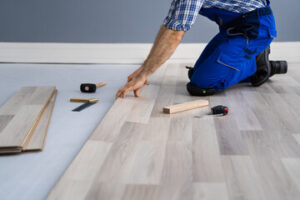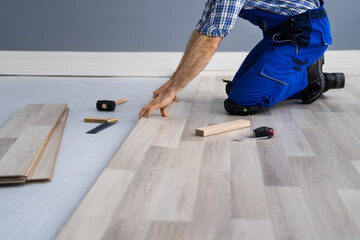Refinishing a hardwood floor is a great way to add value to your home. But it’s also a tedious process, and hiring a professional is often the best way to get the job done right.
To find the best company for your hardwood refinishing needs, start by checking their experience. Look for one that has been in business for at least a few years and carries credentials.
When wood floors become faded and worn, they often require a refinishing job to restore them to their original beauty. A hardwood floor refinishing company can sand the flooring to remove scratches, dings, and gouges and then apply new stain and lacquer to make it look as good as new.
The refinishing process is a big project, so customers should choose a reputable hardwood flooring refinishing company that has experience doing the work. This can help homeowners avoid paying for mistakes and unnecessary labor costs.
A quality refinishing company will offer a warranty so homeowners can rest assured that they are protected should something go wrong with the finish. They should also be able to provide estimates that are precise and include all labor and materials costs.
It’s important to ask about the prep work that will be done before the refinishing is done. This will give you a better idea of how long the process will take and whether or not any additional fees will be incurred.
Before the refinishing begins, the contractor will need to remove all furniture and rugs from the room. This is usually not included in the price of the refinishing but is necessary to protect furnishings from being damaged during the sanding process.
Once the prep work is complete, the contractor will sand the floor using a drum sander with a HEPA filter or a hand-held sander. Then, they will apply a high-quality stain and lacquer to the flooring.
The refinishing process usually lasts between 3 and 4 days. It may be longer, depending on the amount of prep work required.
During the refinishing process, the contractor will use a sanding machine to remove all debris and old finishes. They will then reapply the new finish to the floors and make any necessary repairs to the subflooring.
When the refinishing is completed, the floor will be smooth and shiny. Customers can choose from a variety of finishes, including glossy, satin, and waxed.
A refinishing company will usually have a warranty that is valid for a year or more, so customers can feel confident that their hardwood flooring will be safe and beautiful for years to come. The best refinishing companies also have a solid reputation and great customer reviews.
One of the best ways to find a reputable hardwood floor refinishing company is by asking around. Look for references from previous customers, and if you can, ask to see their completed projects in person. This will help you narrow your search and give you a better idea of the quality of work you’re likely to get.
While there are many hardwood refinishing companies out there, only the best will deliver results that exceed your expectations. The most impressive wood refinishing companies will have several years of experience, a solid track record of satisfied customers, and the tools and know-how to get the job done right.
Besides using the best wood refinishing products on the market, your wood refinishing company should also take the time to educate you about the product and your options. They should also be happy to provide samples for you to try out before making a purchase.
The best wood refinishing companies will not only have the best product lines; they will have the most knowledgeable salespeople to answer any questions you may have about their products. This can include questions like which floor finish will be best for your home or how much it will cost to refinish a certain type of flooring.
The best wood refinishing companies will also use the most advanced sanding and cleaning equipment to make your hardwood floors look new again. They should have a clean, organized work area with plenty of supplies on hand to get the job done right. The best hardwood refinishing
The cost of refinishing hardwood floors varies depending on the size of the project, the condition of the wood, and the flooring contractor’s labor costs. For example, a 300-square-foot kitchen might cost about $600 to $1,200 to refinish, while a 1,000-square-foot basement might cost around $2,000.
Refinishing hardwood floors costs about $3 per square foot, including materials and labor. This includes sanding, staining, and finishing the hardwood floors. This refinishing process can remove stains, scratches, dents, fading, and discoloration from the floors.
A refinishing job may also remove pet stains, water damage, and dings. It also can add a new sheen and make the floors more durable.
Typically, refinishing involves using chemicals to etch the old finish off and then applying a new one on top. This process requires a lot of prep work, including removing all furniture and sweeping the floor before the refinishing process begins.
This type of refinishing process can be more expensive than sanding and staining because it requires additional cleanup and preparation. It also involves the use of heavy equipment.
Homeowners can save money on the refinishing process by doing their own prep work and cleaning up after the project is complete. They can also choose a refinishing contractor who doesn’t charge extra for cleaning.
To find the best refinishing company, homeowners can search online and call local contractors for quotes. They should also visit the company’s website and check out its past projects to get a feel for what type of work it does.
It’s best to choose a refinishing company that has been in business for more than five years. This will ensure you’re getting a quality job done.
A refinishing company that has been in your area for a long time can help you avoid scams, low-quality products, and poor service. In addition, a good company will give you a detailed estimate, contract, and warranty in writing before the work begins.
Warranties are a tricky issue for flooring contractors. Typically, manufacturers provide their products with a manufacturer’s warranty that covers labor and materials used in the installation of the product. But sometimes, project owners or general contractors require an additional warranty from the flooring contractor, which may extend past the manufacturer’s warranty.
In some cases, the additional warranties are spelled out in the contract and can be difficult to read and understand. It is best to review the warranty carefully, especially if you are installing for a client who is not well-versed in the details of hardwood floor refinishing.
Another problem with wood flooring warranties is the long list of exclusions, such as sunlight damage, “rough use,” pet damage, and other issues that are not usually caused by the product itself but rather by poor maintenance. Fortunately, many experienced manufacturers offer a longer warranty than others, so following your manufacturer’s warranty closely will help ensure that your flooring investments are protected for years to come.
Shaw warrants that its solid hardwood floors will not delaminate when installed and maintained in accordance with Shaw’s installation and maintenance guidelines and recommendations. In the event that this happens, Shaw will either replace the damaged material or recoat the affected area of your floor.
Similarly, Shaw’s engineered hardwood floors will not delaminate when professionally installed and maintained in accordance with Shaw’s guidelines and recommendations. In the event that this occurs, Shaw will either replace the damaged material or, at its option, recoat the affected area of your floor.
Natural variations in color, grain, small knots, and mineral streaks are normal features of all hardwoods. These variations are not considered defects, but they can be frustrating to homeowners who are concerned about the visual appearance of their floors.
Additionally, Shaw does not warrant squeaks that occur within the first two (2) years of installation. Regardless of the cause, if squeaks are reported during that period, Shaw will pay reasonable labor costs as described in the tiered labor scale contained within the “Terms of Limited Warranty” to repair the affected area of your floor.
